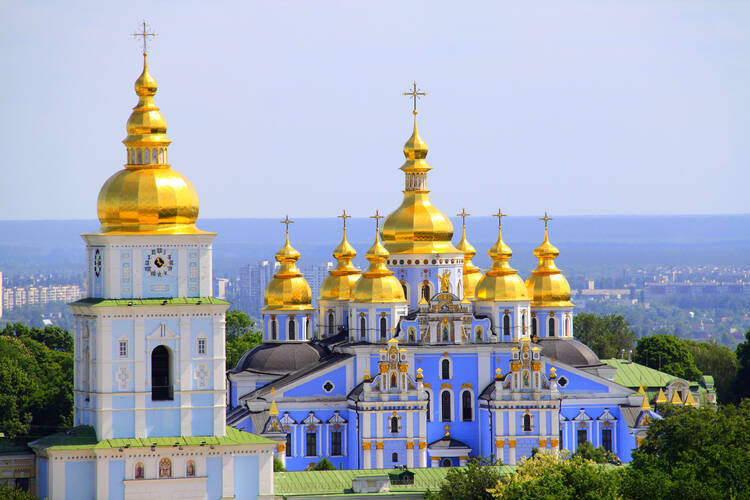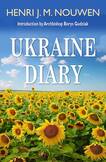Review: Henri Nouwen’s profound encounters in Ukraine
Its cover adorned by a bright blue sky overlooking a field of sunflowers, Ukraine Diary stood out among the books on display when I first saw it at a Catholic bookstore. When I looked more closely, I was stunned to see a familiar name: “Henri J. M. Nouwen.” I thought I had extensively surveyed the English-language literature at the intersection of Ukraine and Catholicism. How had I missed an entire work on Ukraine by this renowned Catholic spiritual writer?
Quite easily, it turns out, as Ukraine Diary was published just this year. With an introduction by his longtime friend, Archbishop Borys Gudziak, and an afterword by his brother, Laurent Nouwen, the core of the volume is the journal Nouwen kept during his two trips to Ukraine in 1993 and 1994. These short visits had a profound impact on him, and at the time of his sudden death in 1996, he was planning to spend a semester at the school now known as Ukrainian Catholic University. Through his diary, the reader encounters Ukraine as Nouwen did, in the early years of post-Soviet independence. Nouwen’s observations, however, are even more relevant today than they were at the time of his writing, offering valuable insight into the ongoing tragedy of the war in Ukraine.
Through his diary, the reader encounters Ukraine as Nouwen did, in the early years of post-Soviet independence.
Part travel memoir and part prayer journal, the book chronicles both the day-to-day logistics of Nouwen’s travels and his spiritual journey. Despite his initial reluctance, Nouwen accepted the invitation of Borys Gudziak (a former graduate student he had befriended while teaching at Harvard) and Zenia Kushpeta (a friend from the L’Arche Daybreak community where he served) to visit the Lviv region of Ukraine in the summer of 1993, and he returned with them again the following year. During these trips, Nouwen preached, led retreats and workshops, met with disabled persons and explored opportunities for collaboration between L’Arche Daybreak and the nascent Faith and Light communities in Ukraine.
In size and scope, this volume is modest. One might think that the book’s relevance is merely a coincidence of the author’s and the subject’s renown as Ukraine continues to dominate the headlines. This would be a mistake. In the days preceding his first trip, Nouwen sensed the opportunity for a profound encounter, writing: “This can be just one more educational experience or it can be a chance to be touched in a vital, new way. But it is your choice.” The same could be said of this volume; for the reader who chooses to approach it as such, it is an opportunity to encounter Ukraine in a “vital, new way.”
As the preface notes, Ukraine Diary “stands as a kind of time capsule, a window on the time when it was written, which at the same time bears a message for its own time.” Indeed, it contains many important messages as the United States becomes increasingly polarized around the question of support for Ukraine. On the political right, some policymakers and commentators are hesitant not only to provide Ukrainians with military aid but even to acknowledge the justice of their cause or their heroism in defending their homeland. Americans on the political left are generally supportive of Ukraine, but one often has the impression that they are conflating Ukrainians’ values and motivations with a secular, progressive American agenda. Both sides are imposing preconceived ideas on Ukrainians and, in doing so, miss the true meaning behind their sacrifice. In this context, two themes in Ukraine Diary take on particular importance for American Catholics seeking to understand the war in Ukraine through the lens of faith.
The first of these themes is listening. Nouwen strove to listen to the Ukrainians he met, to their history of suffering and perseverance, but above all to the stirrings of the Holy Spirit as he encountered them. Archbishop Gudziak writes that Nouwen “sought to discern how God works in history and in the lives of human beings in whatever land they may inhabit.” His attitude of listening, with both his ears and his heart, granted him remarkable insight into the character and identity of Ukrainians. Among his descriptions of daily schedules, locations and retreat programs, certain observations stand out as profound, and even prophetic.
How he arrived at these insights is as instructive as the observations themselves, though. Nouwen teaches us by example that we must listen to the Ukrainian people before attempting to formulate policy prescriptions or make judgements about the causes and conduct of the war. We must learn their history and allow them to tell us what they need, not just physically but spiritually. We must be attentive to God’s voice as we allow ourselves to see Ukrainians as they are: not as an extension of American political agendas but as human persons, beloved of God, with their own history, culture and future.
This is a difficult task, particularly because most Americans have no firsthand experience of Ukraine. How, then, can we listen to the Ukrainian people as Nouwen did? Archbishop Gudziak’s powerful introduction (arguably the highlight of this volume) is a good place to start. Archbishop Gudziak places the Russia-Ukraine war in historical, political and moral context, giving voice to the deepest yearnings of the Ukrainian spirit along the way.
Nouwen noted the deep wounds inflicted by centuries of oppression in Ukraine, but he also saw the potential for renewal.
As he draws connections between Nouwen’s insights and the current crisis in Ukraine, a second theme of particular importance emerges: God is at work in history and in Ukraine. Through their willing participation in this work, Ukrainians’ suffering is endowed with Christian meaning. Archbishop Gudziak masterfully uses the language of incarnation, passion and resurrection to lead the reader toward a deeper understanding of Ukraine’s struggle: “Henri visited the land of Ukraine in its nativity. Now, in the minds of many, it is being born again. This advent, marked by pain and blood, is transforming the world.” Archbishop Gudziak’s portrayal of a people willing to insist on their God-given dignity in the face of impossible odds merits his insight that “there is something supernatural, even Christ-like, in this sacrificial love.”
Where there is Christian sacrifice, there is the possibility of redemption. Nouwen noted the deep wounds inflicted by centuries of oppression in Ukraine, but he also saw the potential for renewal. His own life bore witness to God’s ability to bring good out of evil; his untimely death, just as he was preparing to return to Ukraine, was not wasted. In the book’s afterword, Laurent Nouwen recounts how his brother’s unfinished mission inspired him to serve the poor and marginalized in Ukraine for the past 25 years. Death and destruction do not have the last word. Ukraine Diary shows us that, through the “self-offering” of Ukrainians, the world has an opportunity to reject the logic of “might makes right” and to embrace human dignity and solidarity.
Near the end of his diary, Nouwen remarks that “in the story of the Last Judgment, God judges not individuals, but nations…. [T]o care for the poor…means also to care for the nations that are crushed by the forces of history and live under the burden of being ignored and rejected by the international community.”
Although no longer ignored, Ukraine now suffers the consequences of centuries of rejection. While Ukraine Diary does not offer a specific policy prescription, it is nearly impossible to read this book without concluding that we, as Americans and as Christians, have a moral obligation to help the nation that has found itself “in the heart of history and the heart of God.” This timely book is essential reading for American Catholics, and all Christians, who wish to better understand the war in Ukraine in light of their faith.
This article also appeared in print, under the headline “Profound Encounters,” in the September 2023, issue.











